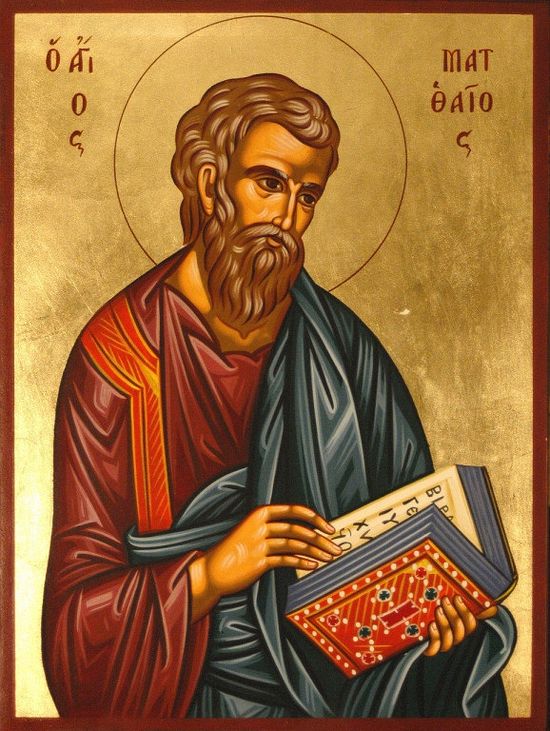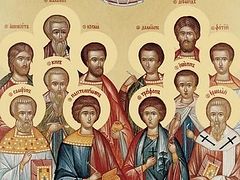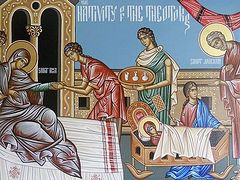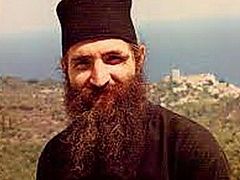Source: Hermitage of the Holy Cross
November 29, 2015
The Apostle and Evangelist Matthew, like the Evangelist John, was one of the twelve Apostles, whereas the Evangelists Mark and Luke were of the Seventy.
The Apostle Matthew was first called Levi, as we are told in Luke’s Gospel. As Peter was called Simon (cf. St. Mark 3:16, St. Luke 6:14) and Paul was called Saul (cf. Acts 13:19), each of them receiving a new name from Christ. Levi was a tax collector (i.e., publican) and spent his days in the tax collector’s booth (i.e., custom house), in Capernaum, collecting money from his fellow citizens.
We can understand the type of employment Levi had, and how his countrymen thought of his trade, by reading what he wrote regarding publicans in his Gospel. We find that the word “publican” is used as a derogatory term and is often synonymous with “sinner” and “heathen.” For example, Matthew writes that if we love others as they love us we do not deserve a reward because even publicans do the same (St. Matt. 5:46-47). He also mentioned that Christ was viewed negatively because he was accused of eating with publicans and sinners (St. Matt. 9:10-11; 11:19). Another reference is made when he writes that if a Christian is corrected by an elder of the Church but does not listen, he is to be treated as a heathen and a publican (St. Matt. 18:17). Lastly, we see that publicans are even grouped with harlots, when Jesus, speaking to the Pharisees, said: “Verily I say unto you, that the publicans and the harlots go into the kingdom of God before you” (St. Matthew 21:31).
One day while Levi was applying his trade in the custom house, Jesus walked by and, upon seeing him, said, “Follow me.” It is said of Levi that at that moment, “he left all, rose up, and followed Him” (St. Luke 5:27, cf. St. Matthew 9:9). Next, the Apostle Luke writes:
Levi made him a great feast in his own house: and there was a great company of publicans and of others that sat down with them. But [the] scribes and Pharisees murmured against his disciples, saying, “Why do ye eat and drink with publicans and sinners?” And Jesus answering said unto them, “They that are whole need not a physician; but they that are sick. I came not to call the righteous, but sinners to repentance.” (5:29-32)
Note that this is what Christ does (i.e., the calling of sinners to repentance) and that this is precisely what just happened. Christ called Levi the publican who then repented and became the Apostle Matthew. In this brief encounter with the conversion of the Apostle Matthew and then Christ dining at his house and saying to his critics that he has come to call sinners to repentance, we see an illustration of what the Gospel is amidst those who don’t understand it and criticize Christ for it. St. John Chrysostom explains to us in more detail of what the Gospel is, saying:
And [the Apostle Matthew] hath properly called his work by a name (which signifies) good tidings. Yea, for it was removal of punishment, and remission of sins, and “righteousness, and sanctification and redemption,” (cf. 1 Cor. 1:30) and adoption, and an inheritance of Heaven, and a relationship unto the Son of God, which he came declaring to all; to enemies, to the perverse, to them that were sitting in darkness. What then could ever be equal to these good tidings? God on earth, man in Heaven; and all became mingled together… and reconciliation made between God and our nature, the devil brought to shame, demons in flight, death destroyed, paradise opened, the curse blotted out, sin put out of the way, error driven off, truth returning, the word of godliness everywhere sown, and flourishing in its growth…[1]
Little is written about the Apostle Matthew throughout the rest of the Gospel except that he was one of the twelve Apostles with Christ. After Christ’s Ascension and the descent of the Holy Spirit, the Apostle Matthew stayed in Jerusalem preaching the gospel with the other Apostles. It is at this time that he wrote his gospel. When it came time for the Apostles to disperse to preach the Gospel throughout the whole world, he preached in Macedonia, Syria, Persia, Parthia, Media and Ethiopia all the while establishing churches.
While in Ethiopia, he came to a town called Mirmena, where there were many cannibals. There the Apostle Matthew appointed his fellow traveler, Platon as Bishop. Matthew then retired to a cave for solitude in which he prayed for the salvation of these people. The Lord appeared to him in the cave as a youth and gave him a staff telling him to go and plant the staff at the doors of the church that he had constructed. The Lord then said,
This staff shall through My power grow into a lofty tree, and the tree shall bring forth abundant fruit, surpassing all the other fruits of the orchard in magnificence and sweetness, and from its root a spring of pure water shall flow forth. Washing in the water of that spring, the cannibals shall receive comeliness of visage, and everyone that but tasteth of that fruit shall forget his bestial habits and shall become a good and meek person.[2]
The Apostle took the staff and went into the town. On his way to the church, he met the princess of the town and her son who were possessed by demons. He expelled the demons, and these two followed him. Upon hearing of the Apostle’s arrival, Bishop Platon came to meet him outside the church. The Apostle did as he was commanded and planted the staff in the ground. There were many onlookers and the staff became a great tree growing beautiful foliage and abundant fruits. From beneath its roots, a stream began to flow. The entire city began to gather around to witness the miracle, and Matthew preached the gospel to them. Many believed and were baptized in that miraculous stream.
The prince of the town, who was named Fulvian, was elated to have his wife and son healed but later became enraged at the Apostle because the town’s citizens were turning away from their gods. At first he sent guards to arrest the Apostle but after they had failed several times, the prince took guards and went himself to arrest the apostle. Upon attempting to seize him, the prince was blinded. He asked Matthew to heal his blindness, the Apostle made the sign of the cross over his eyes, and his sight was restored. Pretending to bring the Apostle to the palace to honor him, the prince instead tied him up and proceeded to burn him at the stake as a warlock. The conflagration soon went out, and the Apostle Matthew was seen to be alive and unharmed. Growing more furious, Prince Fulvian refused to believe the miracle and set upon preparing another fire with dolphin oil, pitch, and tar. The prince commanded that twelve golden idols be placed around the fire, and he prayed to them asking that Matthew not be delivered from the fire. Suddenly the flames of the fire spread and engulfed all of the idols. A loud clap like thunder was heard then all of the idols melted like wax, and many unbelieving onlookers were burned. The fire, taking the form of a serpent, approached so close to Prince Fulvian that he feared for his life, and yelled out to the apostle for help. At the Apostle’s prayers, the flames abated. Fulvian wanted to put the fire out in order to save him, but Matthew prayed, “Lord, into Thy hands I surrender my soul!” and then breathed his last.
The prince was still not fully convinced of the miracles and teachings of the Apostle. As a test, he laid the Apostle’s body in an iron coffin and cast it into the sea wishing to see if the power that had saved him in the fire could also preserve him from the water. That night, the saint appeared to Bishop Platon telling him where to find his coffin and asking him to bring it to the prince. Upon seeing the relics of the saint, Prince Fulvian fell before the casket, confessing the one true God, who had preserved his servant. He implored the saint’s forgiveness and expressed his desire to be baptized. Bishop Platon, perceiving the sincerity of his heart, catechized him and baptized him. “And when he placed his hand on Fulvian’s head and was ready to utter his name, there came a voice from on high, saying, ‘Call him not Fulvian, but Matthew!’”[3] Eventually, the prince was ordained a priest and, three years later, he was ordained a bishop, a successor to the Apostles. He is also commemorated on this day.
Near the end of Apostle Matthew’s Gospel, we read about Christ speaking to the Pharisees, saying, “The publicans and harlots go into the Kingdom of heaven before you” (St. Matthew 21:31). St. Andrew of Crete incorporates this verse into his Great Canon and writes: “Christ became man, calling thieves and harlots to repentance. Repent then, O my soul! For the doors of the Kingdom are already opened, and the Publicans and penitent Pharisees and adulterers pass through before thee.”[4] Recalling the example of the Apostle Matthew, let us hasten to repentance, taking heed of St. John Chrysostom’s encouragement to be fervent in soul and to compel ourselves all lifelong and be diligent in proportion to the grace that has been given us.[5]
“Let no man… of those who live in vice despair; let no man who lives in virtue slumber” because Christ came not to call the righteous, but sinners to repentance. [6]
Through the prayers of the Holy Apostle Matthew, Lord Jesus Christ, Son of God, have mercy on us! Amen.




